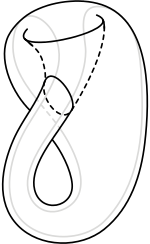Math 132: Smooth Manifolds, Spring 2017MWF 1-2pm, Science Center *309*Instructor: George Melvingmelvin@math.harvard.edu
Office Hours: M 11am-12pm, Th 4.30-5.30pm |
 Source: wikipedia.org |
me | teaching | research
Summary of Lectures
Here are some notes summarising the material we have covered each week. Let me know if you find any mistakes!
Supplementary Exercises
Test Yourself Quiz
Resources
The following is a list of resources (textbooks, online notes, similar courses) that you may find useful and/or interesting. Caution: I recommend finding a resource that you like and sticking with it - jumping back and forth between resources can be a hindrance. This material is standard and each resource says the same thing, though perhaps in a slightly different way.
U = undergraduate level, G = graduate level, R = research level
- Differential Topology, Guillemin & Pollack (U The course textbook.)
- Topology from the Differentiable Viewpoint, Milnor (U/G, excellent though succinct.)
- Introduction to Smooth Manifolds, Lee (G, discusses abstract manifolds and lots of exercises. Available for free with HUID.)
- Introduction to Manifolds, Tu (G, similar to Lee's book. Accessible. Available for free with HUID.)
- Introduction to Differential Forms, Sadun (U/G A nice introduction to differential forms, focusing first on how to use forms in integration.)
- Differential Topology, Hirsch (G Covers a lot of the same material as Guillemin-Pollack but in a more grown-up way. Would be good to read after G-P. Availbale for free with HUID.)
- Differential Manifolds, Kosinski (G/R Focuses on a lot of the mathematics that arose in tackling the gneralised Poincaré Conjecture (in all dimensions). Challenging.)
- Differential Forms in Algebraic Topology, Bott & Tu (G A classic and a must-read for anyone wishing to learn how to compute anything in algebraic topology. Provides an introduction to spectral sequences. Available for free with HUID)
- Dr. Bob's Elementary Differential Geometry, R. Jantzen (U/G Some notes I found online that look like a great introduction to Riemannian geometry for physicists and mathematicians. Quirky but accessible.)
- Morse Theory, Milnor (U/G A must-read for anyone interested in geometry. Morse theory is a simple idea (developed by Marsten Morse (PhD Harvard)) that has repeatedly been used to great effect: in essence, it underlies all significant results in differential topology (and beyond).)